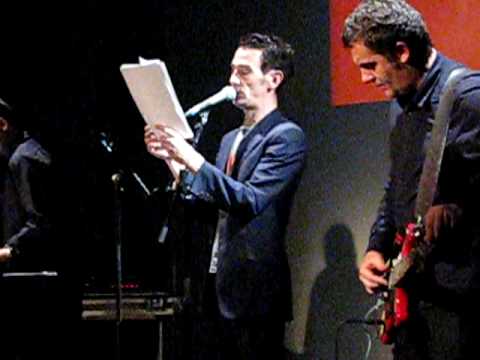"POP IS DEAD POP IS DEAD POP IS DEAD POP IS DEAD POP IS DEAD POP IS DEAD. THE KING OF POP IS DEAD." Anne-James Chaton, his indurate mien impassive and poker-faced, stands as still and stiff as a motorway signpost, just off-centre on the ample stage of the Gaîté Lyrique in Paris. As his rapid-fire verse gushes from between his lips over a loop of his own voice – "POP IS DEAD POP IS DEAD POP IS DEAD" – each plosive consonant is wedded to a glitched burst of sub-bass to create an insistent, technoid beat pattern.
Alone like this, he performs the première partie to his own event, Guitar Poetry, which will later see guitarists Thurston Moore and Andy Moor locking antlers before Chaton re-takes the stage in a trio with the pair of absonant improvisers. This refrain, "THE KING OF POP IS DEAD", is from one of three Événements Chaton performs solo, about the Afghan elections, the inauguration of Barack Obama, and, of course, the death of Michael Jackson; each one a fevered burst of blank-faced concrete poetry, versified reportage spat out like bullets from a gatling gun.
Tonight’s trio of pieces all circulate around events from 2009, but he has been writing and performing this series since the turn of the century. It was while performing several earlier Événements (the word means simply ‘events’) at a festival of experimental music in northern France, back in 2001, that Chaton first met Andy Moor of The Ex. Moor was at the festival playing in an improvised duo with the British sound artist and electronic musician Kaffe Matthews. His bandmate, Terrie Hessels, was there too, jamming with drummer Han Bennink. Immediately having seen Chaton, they asked him to join them on tour and play the support slot for The Ex. Two years later, Moor and Chaton would start making music together, initiating a working collaboration that has endured now for over a decade.
"If I hadn’t met Andy Moor," Chaton tells me over a glass of white wine in a brasserie next door to the venue, "I wouldn’t have gone into some parts of my poetry of today. His way of playing and composing obliged me to invent new ways of writing, different kinds of rhythms." When Moor first heard Chaton’s Événements he said, "’Yeah, that’s really quite amazing. But if we start something together, you can’t keep this way of writing – there’s no space!’" recalls Chaton. "So immediately I knew that I had to search inside myself, to find new ways of working, if I want to let somebody else in. He really obliged me to go out of my own, somewhat closed world."
‘Princess In A Mercedes Class S280’
Their new album together, Transfer, revolves around different modes of transport; "technical things that make you go from one point to another point," but also operations which "make connections, and take you into another state of mind." Criss-crossed by airport departure lounges and celebrity car crashes – one of the tracks, ‘Princess In A Mercedes Class S280’ is concerned with the death of Princess Diana – the record often brings to mind the work of J.G. Ballard. When I ask Chaton if there was a conscious inspiration from the bard of Shepperton, he at first smiles and says, "I think, yes," but then demurs with "inspiration comes from everywhere."
Unlike their previous collaborative efforts, Transfer was not recorded in one time or one place, but was itself a work in permanent transit – such, Chaton tells me, was their "way of life" while building the album. Starting life as a series of four 7" singles, each one concerned with a different mode of transport, the record was expanded with a further three tracks for the CD release. In each case one side of the vinyl would take its materials from fiction (Jules Verne, Agatha Christie, Hermann Melville, etc.), and the other from fact (Wikipedia articles, televised news reports, metro maps). They would spend three or four months on each pair of tracks, sometimes together in one studio or another, sometimes far apart, sending files back and forth through the ether.
"For each piece, we never know at the start who will have the first idea," Chaton elaborates. "Sometimes Andy has an idea of some music, and he will send me some things and that will give me some idea of what kind of rhythm could be good. And from that rhythm, I can imagine what kind of text can be used. Then for another piece, I will have an idea of a text. I’ll send it to Andy and he’ll start doing some sounds. Sometimes I send him some samples that I like and he works with them. So at the end, it’s really a combination." Those samples might come from films, or they could be animal noises, ambient sounds, or weather, inspired by the textual materials being worked on for a given track.
Anne-James Chaton, Andy Moor & Alva Noto live
"For example, if I take the sounds we had in ‘D’Ouest En Est’. The text comes from Jules Verne’s Around The World In Eighty Days. I start to write the text, following [Phileas Fogg’s trip through] the book, but I change each station by forty minutes, working on GPS as I read through the text. At one moment, the hero arrives in India. So I imagined India. I thought: jungle. I thought: elephant. I took some samples of elephants and I sent them to Andy." The result is a fizzing, whirring stew of minimal beats and Link Wray-style surf guitar chords, through which Chaton lists departure dates, vectors and coordinates of a fictional trip around the world. Somewhere underneath all that, an elephant is crying.
There is something almost ‘pataphysical about Chaton’s approach to text. He mentions a fondness for Georges Perec (another Jules Verne fan), the ‘pataphysician and Oulipo member whose novel La Disparition contained no letter ‘e’ and whose first novel, Les Choses, focused on quotidian objects, only introducing its human characters in the third chapter. But for Chaton, the Oulipo were "too systematic – to choose the rules and then see what impact the rules have on the writing."
Chaton’s method is almost the reverse: to start from a set of materials – be they train tickets or a novel by Jules Verne – and then to derive rules from the materials at hand. It is characteristic that his preferred work by Perec is neither Les Choses nor La Disparition, but a radiophonic work from 1978 in which the novelist installed himself in a mobile studio at a particular junction in Paris – the carrefour Mabillon – and simply described what he saw. For over six hours.
"When I started," Chaton confesses, "I asked myself, who can I follow but make it even more sparse, even more cold and objective?" The model he found was the American poet Charles Reznikoff, who founded the Objectivist school of literature. Reznikoff’s magnum opus was a 500 page poem called Testimony made up of the stories told in American court houses between 1855 and 1915, using almost exclusively the words of the actual participants with little authorial intervention. "It’s really simple language," Chaton says, "but quite amazing."
It was this coldness and objectivism that endeared Chaton to Carsten Nicolai, aka Alva Noto, with whom he has also collaborated for many years. "He asked me to keep my way of writing, my presence on the album, even more pure, more radical," Chaton says of working with the German sound artist and Raster-Noton label co-founder. "It’s like we speak in exactly the same language. Me with this kind of poetry and Noto with his kind of electronics."
Alva Noto & Anne-James Chaton – ‘Uni Acronym’
But perhaps even more crucial to Chaton’s development were his encounters with the sound poetry of Bernard Heidsieck and Henri Chopin. "They pushed me to start to mix a way of writing with a way of speaking," he explains. This focus on the sound of the voice gradually raised questions around what technology would be appropriate in what situation. "That’s an element of the writing," he insists. "For example, for the Événements, I chose a really bad lo-fi mic because I knew that this kind of lo-fi mic will make crashes in the sound and then create beats. So I use them like a writer. Microphones are pens."
There is a restless energy simmering behind Chaton’s apparent stolidity. When he is not writing and performing, he is organising and curating. A seemingly compulsive itinerant, as soon as he stops touring his own record with Moor, he is due to start playing tour manager to Thurston Moore’s poetry publishing venture, Flowers & Cream Press. "I don’t want to be on the stage at all times," he insists, "I just want to manage it."
Indeed, Chaton finds that travel informs his poetry in more ways than just the themes of his latest album. "I love when I’m playing in foreign countries to do at minimum one or two pieces in the language of the country – even if I don’t speak it at all," he says. And if he makes mistakes, mis-speaks or mis-pronounces words – all the better. "People really enjoy my errors with language because it makes some strange sense, some strange connections between words. I think this is the life of the writing; it starts at the point when the audience invents its own understanding. I don’t do poems to say. ‘The poem is this’. No. You hear it and you make your own story with it. The way to invent language is to make errors in it."





